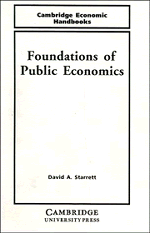Book contents
- Frontmatter
- Contents
- Preface and acknowledgments
- Notation
- PART I Scope and limitations
- PART II Decision making in a mixed economy
- PART III First-order project analysis
- 9 Decompositions and general theory of second best
- 10 Principles of shadow pricing
- 11 Local public goods
- 12 Intertemporal contexts with uncertainty
- 13 Identifying shadow values: hedonic methods and capitalization
- PART IV Evaluating large projects
- Epilog
- References
- Author index
- Subject index
9 - Decompositions and general theory of second best
Published online by Cambridge University Press: 04 April 2011
- Frontmatter
- Contents
- Preface and acknowledgments
- Notation
- PART I Scope and limitations
- PART II Decision making in a mixed economy
- PART III First-order project analysis
- 9 Decompositions and general theory of second best
- 10 Principles of shadow pricing
- 11 Local public goods
- 12 Intertemporal contexts with uncertainty
- 13 Identifying shadow values: hedonic methods and capitalization
- PART IV Evaluating large projects
- Epilog
- References
- Author index
- Subject index
Summary
In most of the rest of the book, we will focus on project analysis. The framework (as developed in Chapters 6 and 7) is one in which decentralized government agencies make independent decisions on collective-goods provision in a mixed economy. The underlying status quo can be any configuration of publicly determined variables that is consistent with private-sector equilibrium. In particular, there will be no presumption of optimality in any of these choices. Any proposed change in this status quo can be thought of as defining a project. Hence, our concept of a project covers such diverse activities as a weather satellite, a pollution cleanup campaign, and a tax reform proposal. Naturally, the agencies cannot act completely independently since they are linked through the budget constraint. Further, we want agencies to take into account all relevant inter-dependencies. The principal aim of project analysis is to find ways of measuring project net benefits that correctly account for general equilibrium relationships and other interdependencies in this economic setting.
Throughout Part III we restrict attention to first-order welfare measures. We will give a precise operational meaning to “first order” in what follows, but informally, our approach amounts to introducing projects in such a way that their size is well defined and finding the best linear approximation to welfare contribution as a function of size. We develop the methodology first in a certainty model with a single jurisdiction allocating uncongestible goods for a closed economy.
- Type
- Chapter
- Information
- Foundations in Public Economics , pp. 145 - 160Publisher: Cambridge University PressPrint publication year: 1988



